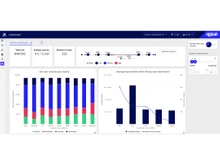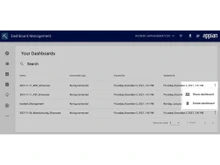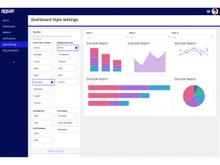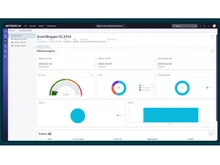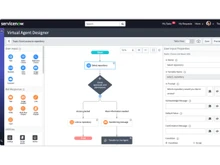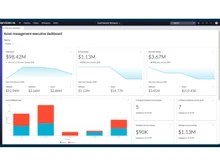Appian stands out as a low-code automation platform, emphasizing rapid application development and customizable business process management. On the other hand, ServiceNow is renowned for its cloud-based IT service management and business process automation solutions, particularly excelling in streamlining IT operations and service workflows. We will compare these two platforms to understand the distinct strengths and focuses of each platform. Understanding the unique features and targeted use cases of both platforms is important to make informed decisions based on specific organizational needs.
Appian vs. ServiceNow: An Overview
Appian is a low-code automation platform that enables organizations to build and deploy powerful business applications rapidly. With a visual development interface and robust workflow capabilities, Appian empowers IT professionals and developers to create custom applications, automate business processes, and improve operational efficiency across various industries.
ServiceNow, on the other hand, is a cloud-based platform that provides a wide range of IT service management (ITSM) and business process automation solutions. It offers capabilities for streamlining IT operations, managing service workflows, automating various business processes, and facilitating enterprise-wide digital transformation initiatives.
Appian vs. ServiceNow: Key Differences
Here are some of the key differences between ServiceNow and Appian in pointers. These include:
- Appian helps in business process management, case management, and workflow automation. ServiceNow and other ServiceNow alternatives are primarily tailored for ITOM (IT operations management).
- ServiceNow relies on the proprietary scripting language Glide and supports JavaScript and HTML for front-end customization. Appian, however, supports multiple programming languages and integrates with popular development tools.
- Appian and a few Appian alternatives offer integration with various systems for seamless connectivity and data exchange. Contrarily, ServiceNow specializes in integrations with IT management tools, emphasizing IT environment connectivity and automation.
Appian and ServiceNow: In Terms of Features
Appian and ServiceNow share similarities in providing low-code development and workflow management capabilities. There are some major differences between the two platforms based on features that can help in making a clear distinction. These include:
- Language/Scripting: Appian supports a wide array of programming languages and integrates with popular development tools. On the other hand, ServiceNow relies on its proprietary scripting language called Glide, which is designed specifically for the platform but also supports JavaScript and HTML for front-end customization.
- Extensibility: Appian offers a flexible and extensible platform with support for creating custom plugins and integration with external systems. On the other hand, ServiceNow is extensible through its own custom applications and integrations.
- Integration: ServiceNow specializes in integrations with IT management tools and systems, emphasizing connectivity and automation within the IT environment. Appian, on the other hand, offers a wide range of integrations with other systems to enable seamless connectivity and data exchange. In the case of integrations, ServiceNow is limited to IT management systems only.
- Access Control: Appian offers advanced access control features to manage security and user permission settings within the applications. However, ServiceNow provides strong access control mechanisms, particularly designed for IT service management and governance needs.
Appian vs. ServiceNow: Development Approach
Appian focuses on rapid application development with a visual development approach, allowing users to build applications through a simple drag-and-drop interface. ServiceNow also emphasizes low-code development but has a strong focus on IT service management and automation, with a particular emphasis on ITIL processes.
Appian or ServiceNow: Use Cases
Appian is typically used for building business process management (BPM) applications, case management solutions, and workflow automation across various industries. ServiceNow is primarily tailored for IT service management (ITSM), IT operations management (ITOM), and IT business management. However, it has expanded to support custom application development.
Appian and ServiceNow: Ease of Use
ServiceNow provides a user-friendly environment for building applications and workflows, particularly focusing on IT service management and automation processes. On the other hand, Appian offers a visually intuitive low-code development interface, making it easy for both developers and IT professionals to create applications quickly.
Appian or ServiceNow: Pricing
The pricing in Appian varies based on specific needs and the scale of the organization, typically offering a subscription-based model. Similarly, ServiceNow also follows a subscription-based pricing model with costs based on usage and the specific modules and features being used.
Appian vs. ServiceNow: Customer Support
Appian provides comprehensive customer support packages, including online resources, community forums, and technical support. ServiceNow likewise offers robust customer support with extensive online resources, documentation, and technical assistance tailored to its IT service management focus. However, Appian has a little edge over ServiceNow in terms of customer support due to its community forums.
Verdict: Appian vs. ServiceNow
In summary, Appian and ServiceNow differ in their development focus, with Appian excelling in low-code application development and BPM across industries, while ServiceNow specializes in ITSM, IT operations management (ITOM), and broader business process automation. Apart from that, Appian is tailored for BPM, case management, and workflow automation, offering support for multiple languages and integrations. Meanwhile, ServiceNow is primarily targeted at ITSM, ITOM, and other business process automation, based on the scripting language (Glide). Both platforms offer extensibility, with Appian providing flexibility and ServiceNow majorly focusing on extending capabilities within IT service management and automation.


 6 Ratings & 0 Reviews
6 Ratings & 0 Reviews




